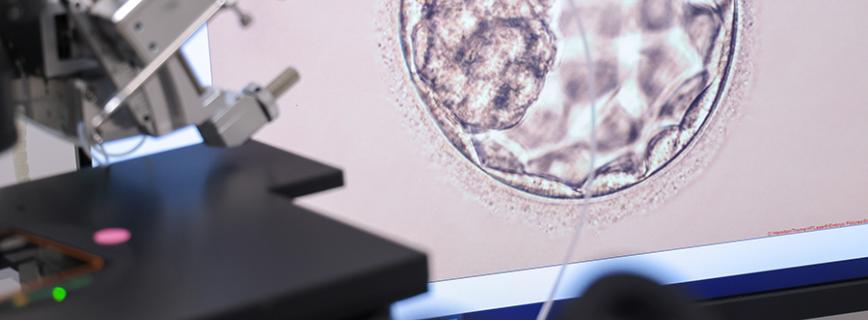
In vitro fertilization (IVF) is a very successful treatment option for infertility. Prior to any IVF treatment, one of our board-certified fertility experts will meet with you to review your history and establish a plan for your unique needs.
IVF is a procedure in which eggs are removed directly from the ovaries and then fertilized using partner or donor sperm. The eggs are fertilized either by placing sperm on the eggs or by injecting a single sperm into each egg using a technique referred to as “intracytoplasmic sperm injection” (ICSI). The resulting embryos are observed and grown in our IVF laboratory, where they are graded for quality and transferred to the recipient's uterus.
All procedures required during an IVF cycle, including ovarian stimulation and monitoring, egg retrieval and embryo transfer, are performed on-site in our state-of-the-art facility.
Pretreatment Preparation
Pretreatment testing may include some or all of the following: blood work, semen analysis and uterine cavity evaluation . To ensure you have the best outcome, we will evaluate your initial assessment and results from your pretreatment testing to finalize your personalized treatment plan.
Ultrasound & Ovulation Medications
After the evaluation and pretreatment preparation, if necessary, you will have a baseline ultrasound to measure the lining of your uterus to ensure a healthy environment before starting medication and to assess egg production. You will begin hormone injections to stimulate the growth of multiple ovarian follicles. Monitoring your hormone levels for several days is important to measure appropriate growth.
Monitoring Visits
The monitoring visit consists of a monitoring ultrasound, a blood test to monitor hormone levels and accurately assess egg maturity. Your provider will have a brief discussion of your progress during these visits. The monitoring phase of the IVF cycle usually requires three to six visits.
Egg Retrieval
The IVF egg retrieval procedure takes approximately 20 to 30 minutes. Once your anesthesiologist has provided you with adequate sedation to rest comfortably, your fertility provider will pass a small needle through your uterus and into the ovary and aspirate the fluid from each of the follicles. The fluid is given to the embryologist to immediately identify each of the oocytes (eggs) and count them as they are found in the fluid. The eggs are then placed into the incubator to be fertilized or cryopreserved.
After egg retrieval is complete, you will be taken back to the recovery area. You or your partner will be told the final egg count prior to leaving the clinic. Recovery after egg retrieval takes one to two hours on average. You will not be allowed to drive or return to work until the next day.
The day after egg retrieval, an embryologist will call you with fertilization results, which usually arrive before 1 p.m.
Embryo Freezing/Preservation
If more embryos survive than are needed at the time of an embryo transfer, you may choose to have your embryos frozen (cryopreserved) for later transfer. Cryopreservation in a cryobank allows for subsequent frozen embryos transfers (FET) and additional attempts at conception without having to undergo additional stimulation with gonadotropins. Embryo freezing improves the overall safety and lowers the cost of infertility treatment.
